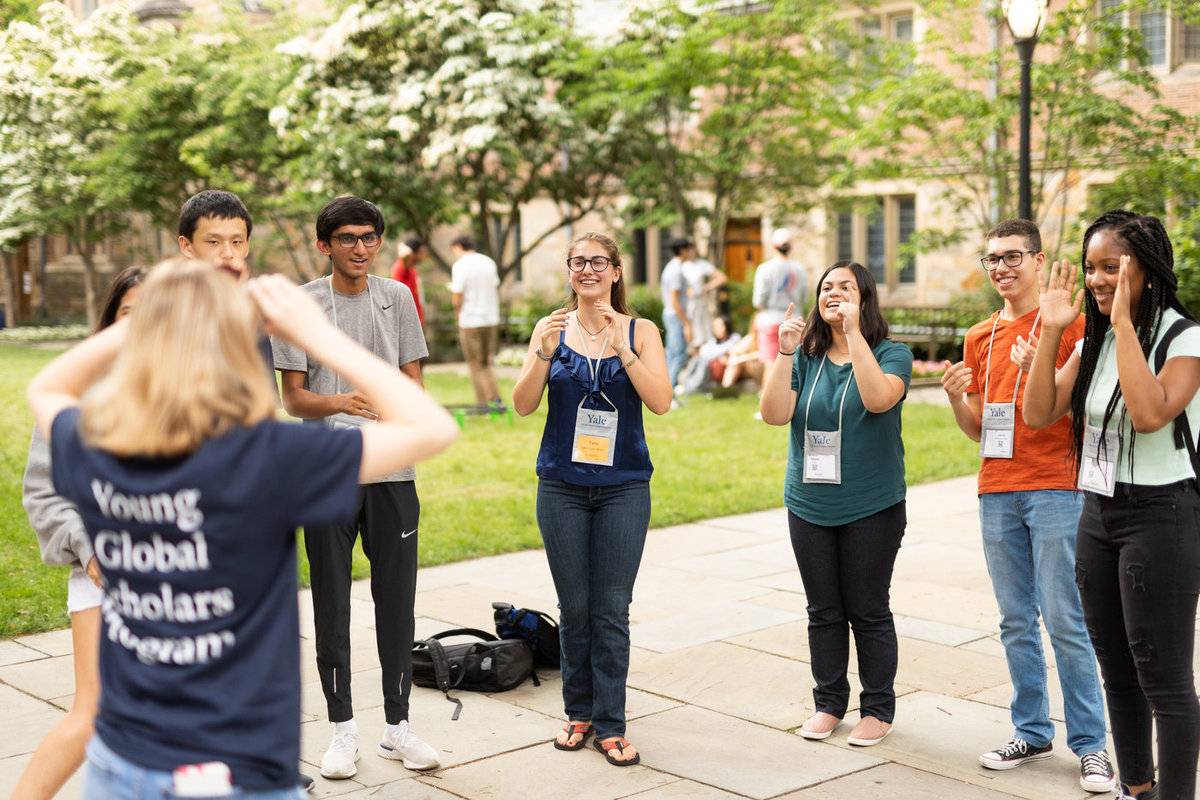Yale Young Global Scholars will return to in-person programming this summer
After the COVID-19 pandemic pushed the program online, YYGS will once again take place on campus.

Courtesy of Yale Young Global Scholars
Over 1,800 students will travel to New Haven this summer to participate in the Yale Young Global Scholars program, which will be hosted on Yale’s campus for the first time since 2019.
YYGS is an academic summer program that brings together students from over 150 different countries and all 50 U.S. states for two-week courses in STEM, social sciences, humanities or a cross-disciplinary track. For the past three summers, the program was run in a completely virtual format dubbed “YYGS Online” due to complications presented by the COVID-19 pandemic.
“When the pandemic hit back in March 2020, we had already admitted 2,400 students,” said YYGS director Elena Gosalvez-Blanco. “We worked really hard to translate [YYGS] into the Zoom space … And now, of course, we have to remind ourselves how to do this in person.”
Zeva Manvi, YYGS associate director of admissions, said that while YYGS typically receives roughly 7,500 applications, this year was especially competitive with over 8,500 students vying for a spot in the program.
She said that this year, YYGS will host approximately 150 students for each of the four academic tracks it offers in three different sessions throughout the summer.
“It was a really record-breaking number of applications, which was thrilling and incredible for us [with] students and families wanting to come back to campus, ” Manvi said.
Manvi said that in planning for the program’s return to Yale’s campus, program administrators sought to improve the program and not just replicate what it has done in the past. She said that doing so involved both reflecting on the past three years and talking with alumni and current instructors.
“There are new buildings, better new opportunities, so we want to think about, if we’re going to bring students together, it can’t be to sit in a dorm room and be on their laptop and attend lectures that way, ” Manvi said. “So we want to think about what the campus itself learned about how to bring students together, create communities and access all the resources that there are now to make this a rich and rewarding experience and the right time to come back to Yale’s campus.”
According to Gosalvez-Blanco, this year’s program will be modified slightly to account for the lessons that program administrators learned when conducting YYGS virtually for the past three summers.
For one, she said, there will be pre-orientation activities conducted on Zoom prior to students’ arrival; previously, students from each session were typically all placed into one room for their orientation before ever having met.
Gosalvez-Blanco also said that before the pandemic struck, students were sorted into housing according to which academic track they were in. However, prompted by the mingling allowed in Zoom rooms during YYGS Online, this year’s housing will be randomized, akin to the model used for housing first-year undergraduates at the University.
Furthermore, the curriculum for YYGS families — smaller groups of roughly ten students in each session — has been standardized and enhanced to ensure that the activities are more of a shared experience across all of YYGS.
“We’ve made some adjustments, we all learned some things during COVID, ” she said. “We’re trying to also learn from these three years of what can be brought into the new in-person [programming].”
Matthew Krick ’22 GRD ’23 was a YYGS student in 2016 and has been an instructor for the program since 2019, teaching STEM sessions. Krick said he saw the opportunity to become an instructor for the program as a way to have a positive impact on students and continue learning through the preparation of different seminars and teaching materials.
He noticed that a lot of the struggles he experienced when teaching during YYGS Online, such as Zoom fatigue and tech issues, were much the same as the ones that were seen in virtual learning settings for undergraduate students across the country.
“I’m really excited to teach again in person and particularly to be able to share different projects and presentations in a format that I think is more engaging for students — when it’s in person, a lot of instruction can feel a lot more direct, and personable, ” Krick said. “Being able to integrate those different learning tools in person, again, is really valuable, and something that I definitely look forward to.”
Manvi said that while YYGS was founded with the intention of fostering a global perspective on pressing issues by bringing together students from across the world to engage in important conversations, YYGS is also meant to offer participating students “a taste of college life.”
Manvi noted that YYGS also gives participants “educational access” and “exposure” to resources at Yale.
“It’s not necessarily about Yale, specifically, it’s about thinking about on any college or university campus, what kinds of resources are there, what’s the range of majors that are available, the range of careers that students could consider, and think about how they themselves might find their best academic, social and financial fit when they’re going through a college application process,” Manvi said.
Originally under the name “Ivy Scholars,” YYGS was founded in 2001 by University professors and administrators with the focus of bringing together and empowering youth from across the globe.







